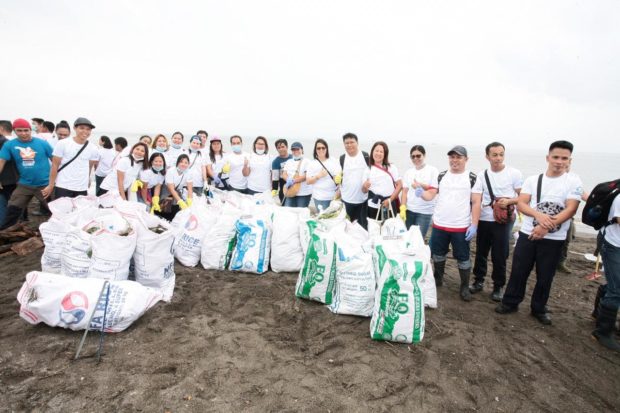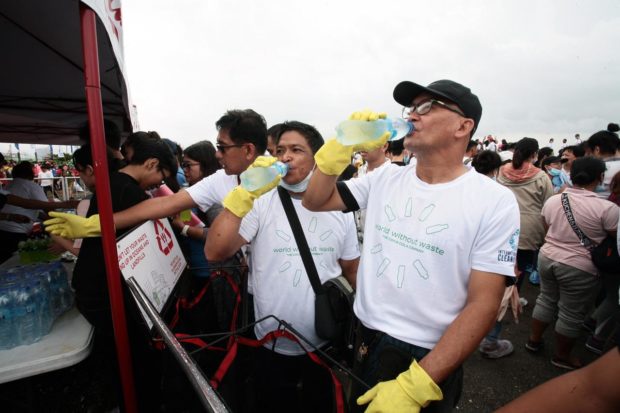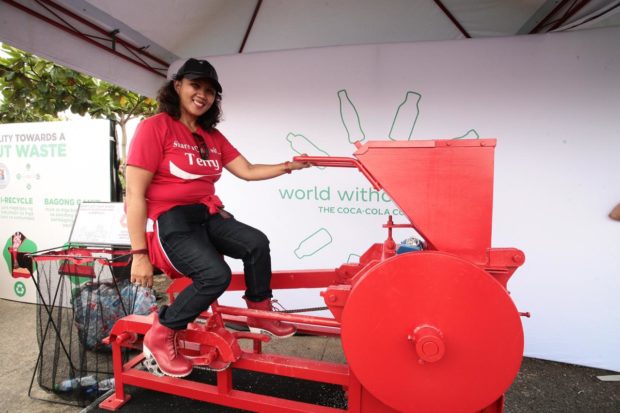What happens to our trash after being thrown away? There is a common misperception that after a product has served its purpose, its packaging simply becomes ‘waste’. However, there are plastic packaging materials that actually go beyond single-use. Some, particularly high-value plastic PET bottles, are valuable resources that can be recycled and reinvented into many useful things.

RAIN OR SHINE. Coca-Cola mobilized thousands of its employees across the Company’s nationwide system with 500 associates volunteering in Baseco Beach during the International Coastal Clean-up.
Because of this misconception, plastic PET bottles are often disposed without collection and recycling in mind, eventually leading this packaging waste to the oceans and seas.
Recognizing its contribution to this pressing issue, Coca-Cola is striving to become a part of the solution, advocating the value of recycling and ensuring that its packaging waste does not end up in such places. The Company envisions a World Without Waste where it closes the loop on its packaging by collecting and recycling the equivalent of 100% of each bottle and aluminum can they sell by 2030.

Coca-Cola refreshes hardworking and selfless volunteers with beverages at the hydration booth during the International Coastal Clean-up Day at the Baseco Beach.
To improve the solid waste management in the Philippines, Coca-Cola is pushing to realize the potential of waste pickers and the recycling industry by working hand-in-hand with various partners including junkshops and materials recovery facilities to guarantee that its packaging is collected and recycled.
Understanding the vital role of each and every individual in creating a World Without Waste, Coca-Cola aims to reach more people by going straight to the communities, helping educate local government units on the circular economy to recreate an effective system of plastic diversion.

Seeing the timeliness of the event in promoting a World Without Waste, Coca-Cola mounted a green activation activity during International Coastal Clean-up at the Baseco Beach, complete with plastic PET bottle collection bins and the Coke Tune-cycle – a bicycle which shreds plastic PET bottles for the production of eco-bricks.
To further show their commitment to the cause of the 34th International Coastal Clean-Up Day, Coca-Cola Philippines mobilized thousands of its employees to participate in cleanups along various shores in the country.
The Company was among the biggest contingents in the massive nationwide clean-up with more than a thousand of employees volunteering across 27 sites including the Baseco Beach in Tondo, and other locations in Cebu, Davao, and more.
Through the Coca-Cola Foundation, the Company was also able to pull in partner environmental NGOs such as the Sarangani Province Empowerment for Community Transformation Forum (SPECTRUM) and the Philippine Rural Reconstruction Movement (PRRM) for this year’s ICC efforts.
In recent years, the Company has also taken a more aggressive stance to ensure the transformation of ICC into a sustainable model. Last year, Coca-Cola and its ICC partners pioneered going beyond cleaning the coasts to also diverting and recycling the waste that is collected from the clean-ups.
Continuing the practice this year, Coca-Cola diverted the collected bottles from the Baseco Beach clean-up to its recycling partner, Green Antz, to be produced into benches that will be turned over to the City of Manila. In Davao, the Company also connected Bantay Dagat, the team behind the Davao clean-up, to Winder, another recycling company with a similar goal.
Apart from the Company’s efforts to set an effective collection system in place in the country, Coca-Cola also announced its investment in a cutting-edge PET recycling facility – the Company’s first recycling facility in the region. The groundbreaking for the facility is set to happen within the year. The facility will help increase the production of recycled PET bottles, closing the loop on its product packaging and bringing the Company closer to its other goal of achieving 50% recycled PET usage by 2030.
Beyond the plastic PET bottles, the rest of the packaging portfolio is also highly sustainable with returnable glass bottles taking up 50% of its production in the Philippines and infinitely recyclable aluminum cans.
Since 1995, the Company has been actively participating in the ICC through educational outreach, community engagement, research, industry collaborations and more. In its 24th year of supporting the ICC, Coca-Cola is developing what once were one-time social movements into purposeful undertakings with the support of stakeholders, uniting countless volunteers in encouraging responsible protection of the seas. All this is a concretization of the Company’s manifesto – Go Beyond Good.
ADVT

